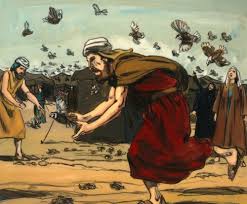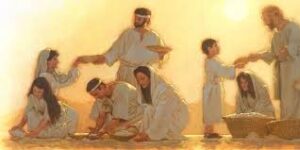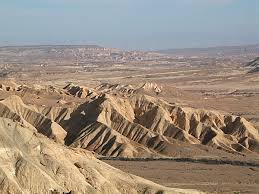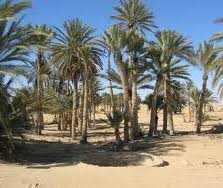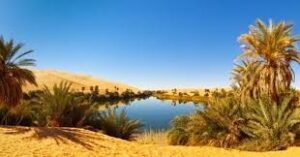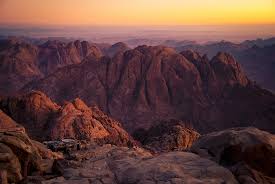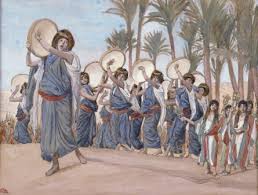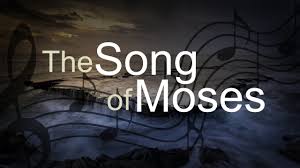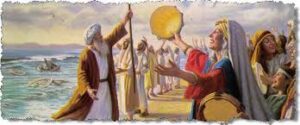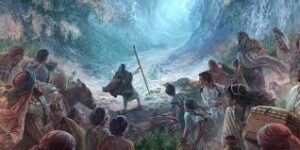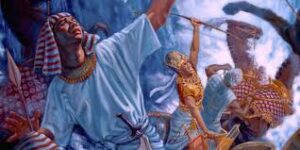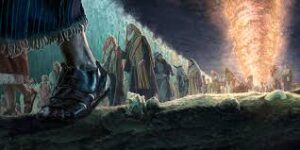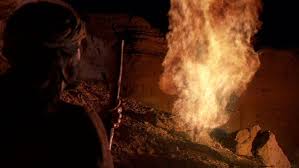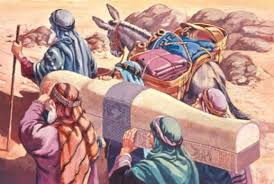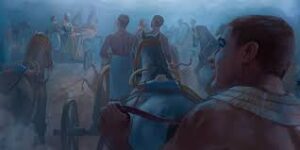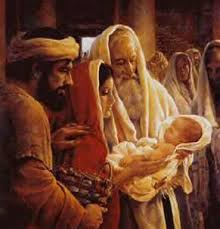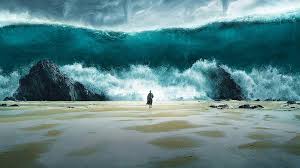Cu – Strike the Rock and Water Will Come Out of It 17: 1-7
Strike the Rock and Water Will Come Out of It
17: 1-7
Strike the rock and water will come out of it DIG: Why is this the same song, second verse? How does this passage compare with 16:1-4? What is wrong with this picture? Why didn’t the water come out until after the rock was struck? Was this for the benefit of Moses, the people, or the elders? Was thirst the only problem? What was the deeper object lesson and how well did they learn it (Numbers 20:1-3)?
REFLECT: Have you been to the rock that was struck for a drink of living water? Jesus Christ says if you drink of that water, you will never thirst again (John 7:37-39)! Are you spiritually thirsty? To see link click Fg – The Peace Offering, and discover how you can receive living water.
And the whole Israelite community set out from the Desert of Sin. Note that in the Hebrew, Chapter 17 begins with the word And, which connects it with Chapter 16. So, too, Chapter 16 opens with the same word, which links it to the bitter water of Marah in Chapter 15. It is such a little word, but it makes such a big difference because there is a common thread of complaining in all three of these chapters. And here, once again, Isra’el was face to face with another trial of faith. Their dependency upon God was tested. This time it was not a lack of food, but the absence of water. How this illustrates the fact that the path of faith is a path of trial. God’s plan is to wean us from everything down here (First Peter 2:11), to bring us to the place where we have no reliance upon material or human resources, but to cast ourselves completely upon Himself. O how slow, how painfully slow we are to learn this lesson. How miserably and how repeatedly we fail! How longsuffering God is with us. This is what the introductory word and is designed to point out. Here in Chapter 17 it is but a tragic repetition of the beginning of Chapter 16.309
They traveled from place to place as ADONAI commanded. If the pillar of cloud moved, they moved; if the pillar of fire stood still, they stood still. Encampment locations at Dophkah and Alush (Numbers 33:12-14) are omitted here to focus on the incidents of testing and complaining.310 They camped at Rephidim, which was their last stop on their way to Mount Sinai. It was probably either Wadi Refayid or Wadi Feiran, both of which are not far from Jebel Musa, the traditional site of Mount Sinai in the southeastern region of the peninsula.311 But there was no water for the people to drink (17:1). At Marah there was water, although bitter, but God made it sweet. At Rephidim, however, there was no water at all. It would have to be created out of nothing (Genesis 1:1).
Again, the lack of water became a stumbling block. But this time their rebellion became much more of a problem than the last incident at Marah (15:24) or in the Desert of Sin (16:1-3) because a mob mentality began to develop. Parched from their journey and finding no water, they complained to Moses and were almost ready to stone him (17:4). The leadership and capability of Moshe should have been established by then, but to a people easily influenced by the mixed multitude (12:43-51), and the difficulty of the circumstances made Moses’ track record easy to forget. Such complaining, Moses said, put God to the test (17:2), that is, they were challenging God or trying His patience rather than trusting in Him.312 In fact, the whole history of the desert wanderings of the Israelites is a good example of the longsuffering of ADONAI with a people who constantly tested and provoked Him (Psalm 78:56; 106:7, 14, 25, 29).
While there is no doubt that the shortage of water reached a dangerous level, the people should not have tested Moshe, but should have turned to God who had already proven His ability to provide for them in the past.313 But the people were thirsty for water there, and they complained to Moses. They said: Why did you bring us and our children and livestock to die of thirst (17:3)? Their language is angry and hostile. However, God, as always, graciously supplied the people’s need. ADONAI answered Moshe and commanded: Walk on ahead of the people. Take with you some of the elders of Isra’el and take in your hand the staff with which you struck the Nile (7:20), and go from Rephidim to the region of Mount Horeb (17:5). Horeb was the place where God had revealed Himself to Moshe at the burning bush (3:1-5). It refers to a range of mountains. So Horeb is a mountain range that contains Mount Sinai. The slopes of Horeb reached Rephidim, so the walk that Moses and the elders took was not a long one.
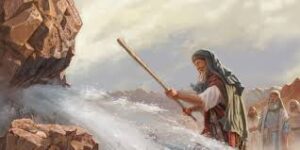
God announced that He Himself would: Stand there before you by the rock at Mount Horeb. Some argue this is merely anthropomorphic language, using human imagery to describe the presence of God. Others see a theophany in which the pillar of cloud descended upon the rock. Either way, God was at Horeb in a special, unique way in order to provide for His people. He said: Strike the hard, dry rock with your staff, and water will come out of it for the people to drink. It was not until the rock was struck with the staff of Moshe that the water gushed out. This was another Exodus-like event.314 Because water is a picture of the Ruach ha-Kodesh (John 7:38-39), this foreshadows the coming of the Spirit of God at Shavu’ot (Acts 2:1-4) after the death of Christ on the cross (Isaiah 53:4-12; John 19:16b-37). We learn more about this incident in the Psalms. He opened the rock, and water gushed out; like a river it flowed in the desert. For He remembered His holy promise given to His servant Abraham (Psalm 105:41-42). It was because of His covenant with Abraham (Genesis 15) that God gave the water to Isra’el.315 So Moses did this in the sight of all the elders of Isra’el so that they could be witnesses to the miracle and relay what they had seen to the unbelieving people (17:6). The word rock is used here in a literal sense. There was a real rock at Horeb and when Moshe struck it, real water came out of it, providing water for the children of Isra’el.
However, whenever the word rock is used symbolically, it is always used of the second person of the Trinity, or Jesus Christ. The Paul makes this very clear when he wrote to the church he had founded in the city of Corinth. He said to them: For I do not want you to be ignorant of the fact, brothers, that our forefathers were all under the cloud and that they passed through the Red Sea. They were all baptized into Moses in the cloud and in the sea. They all ate the same spiritual food and drank the same spiritual drink; for they drank from the spiritual rock that accompanied them, and that rock was Christ (First Corinthians 10:1-4; also see Hebrews 11:24-26).
So, although the Bible uses many symbols, it uses them consistently. Whenever the word rock is used, it is a picture of Christ, although sometimes it will have a slightly different emphasis. There are seven examples of this. First, sometimes when the rock is used of Christ, or the Messiah, the emphasis is on His deity, as the God-man (Genesis 49:24; Deuteronomy 32:15; Second Samuel 23:2-3; Psalm 18:31; Matthew 15:16-18).
Secondly, the emphasis on His pre-existence is found in Dani’el 2:34 where Christ is referred to as a rock that was cut out, but not by human hands.
Thirdly, another usage is that Christ was the stone has been tried, tested and proven to be true. Like the Lamb of God, He was without spot or blemish (Isaiah 28:16; First Peter 2:4 and 6).
Fourthly, still another usage of the word rock is used in reference to the Messiah as the foundation (Matthew 16:18, 21:44).
Fifthly, to the Jews and other nonbelievers He is a stone that causes men to stumble and a rock that makes them fall (Isaiah 8:14; Romans 9:32; First Corinthians 1:23; First Peter 2:8).
Sixthly, another common motif of the stone in reference to Christ is to call it the rejected stone, because the TaNaKh made it clear that when the Messiah came the first time, He would be rejected by His people (Psalm 118:22; Matthew 21:42; Mark 12:10; Luke 20:17; Acts 4:11). Therefore, out of this historical incident a picture of the Messiah begins to develop. He would be a proven and tested stone, but is rejected by the nation of Isra’el to become a stone of stumbling.
Ultimately, however, He would become the cornerstone of the Church (Isaiah 28:16; Ephesians 2:20; First Peter 2:6).
In Numbers 20:8-12 we are told of a second time that the children of Isra’el complained that they had no water. The first time Isra’el complained about being thirsty, God told Moses to strike the rock and water would come out of it for the people to drink. In Numbers, however, God gave Moshe different directions. He told Moses to speak to the rock and water would pour out of it. Moses was supposed to speak to the rock because the Messiah was to be stricken only once. After that we only need to ask for salvation. Christ was crucified twenty centuries ago, and from the cross He said: It is finished (John 19:30), and it was finished indeed. He does not have to be crucified again. When He comes back a second time it will not be to die; it will be to rule and reign the entire world as the Lion of the Tribe of Judah (Revelation 5:5). God the Father is satisfied with what God the Son did for you. The question is, “Are you satisfied with the work Christ did for you on the cross?” He died to save you. All God the Father is asking, is that you believe in, trust in, have faith in, His Son.316
And Moshe called the place Massah, or testing, because the Israelites tested Him there, and he also called the place Meribah, or complaining, because the Israelites complained to God saying: Is ADONAI among us or not (17:7)? Like Pharaoh before them, how many times did they need to see God work before they understood? Did they not see that God had their best interests at heart? Did they not see that He had moved mightily from the time of the patriarchs to come to that very moment and He wasn’t going to let a little thing like the water supply stand in the way of fulfilling His plan?317 Still the people complained, and the fruits of their complaining would sow thorns of conflict in the future. And conflict would breed contention. Soon the Amalekites would attack the Israelites, and then it would be Isra’el who would be tested.




